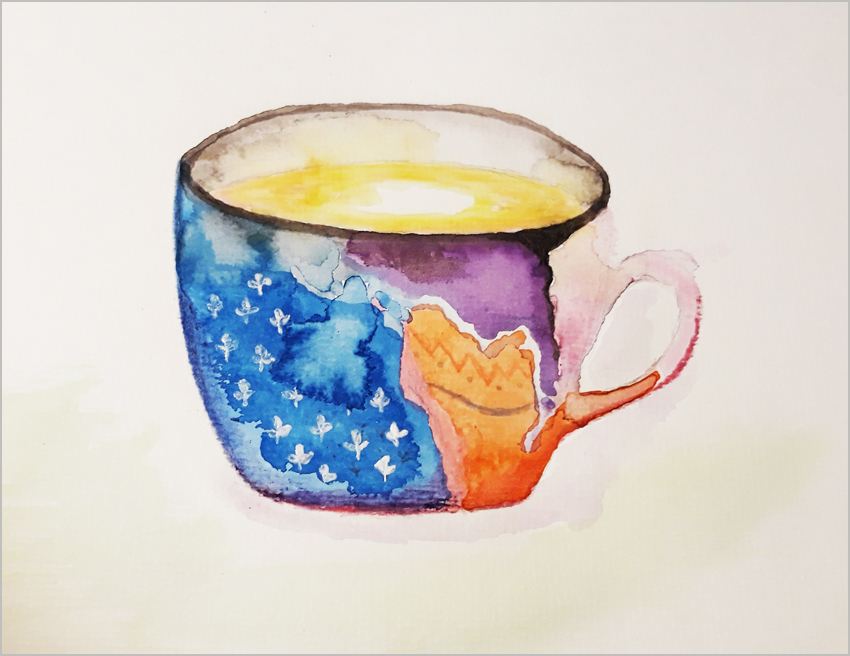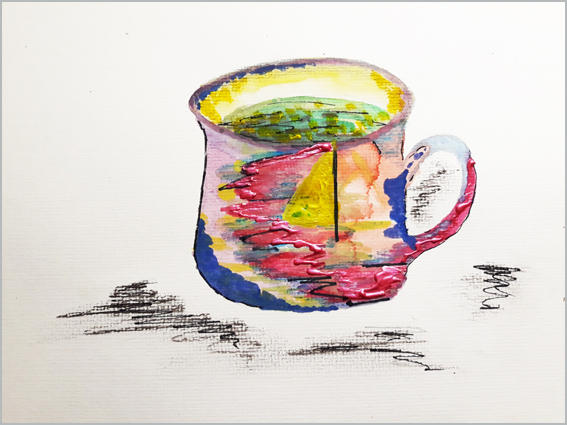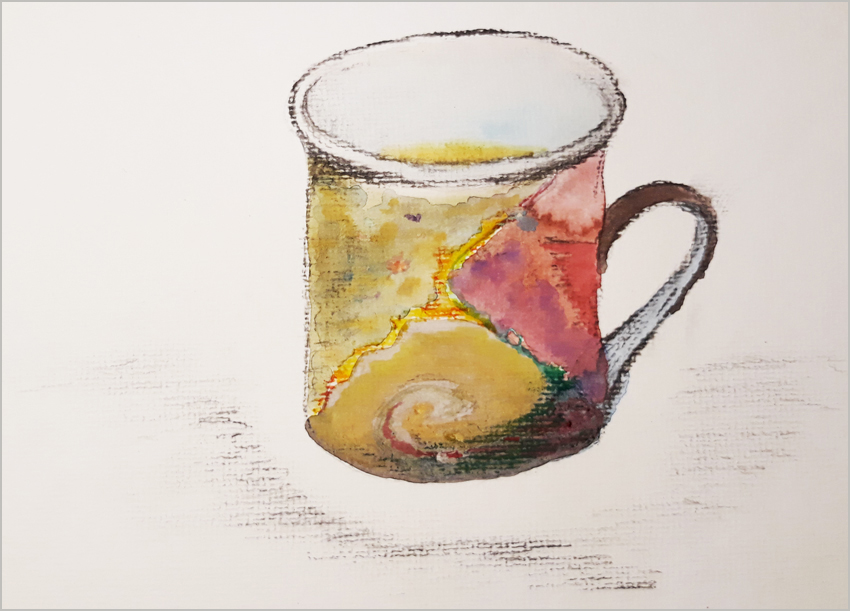The potential of storytelling to shape politics and law
Drinking tea with three Afghan men and getting involved with their stories can change perspectives. Having experienced this, Tamara Tries decided to examine how politics and law can be directed by individual storytelling. For the MPM she writes about three different cups of tea, and the political and legal potential of three different stories.
/// In order to preserve the anonymity of the storytellers, their names have been changed. Tamara illustrates their personalities in three cups of tea. ///
Since 2015, many people started talking about refugees. The public discourse was withal dominated by narratives about “the poor victim, who has to be taken care of in Europe”, or “the threatening big mass, which is too big to handle”. In order to break through those narratives, I decided to collect the stories of young Afghan men who had come to Austria a couple of years ago as so-called unaccompanied minor refugees. Stories of people about whom many talk but to whom is not talked much. I implemented these stories in a qualitative research for my master thesis.
Beginning my journey collecting the stories, I started in a small village in Austria. I had never been there before, so I was searching for the house in which Etaht was already waiting for me. Struggling to find the right number, I slowly drove along the narrow streets. Suddenly I heard someone whistling. It was Etaht who had already been waiting for me and, with some amusement, witnessed my struggle to find the right house from his window before he quickly ran to the street to show me the way. This is how I know him: reliable, punctual, and always concerned about the well-being of other people. He can be very focused and serious, but he will always make sure to include little jokes here and there to create a relaxed atmosphere in which everyone can feel comfortable.
Etaht likes being in Austria, but is concerned when observing current developments
Since he was a child, Etaht dreamed about coming to Europe: “But I did not think, I would come here to save my life.” In 2015, he did not make the decision to travel overseas, but the situation in his village made him do so. He values the safety in Austria, appreciates a stable electricity supply – probably more than most locals, and the helpfulness he experienced with many people. He emphasizes that he met many nice people here but is still concerned about the images about refugees presented in the media. “If they watch the news, they become mad at us”, he explains. The power of the media, which is able to manifest strong prejudices about refugees within society, mak es socializing significantly harder for refugees. In order to get settled within Austrian society, it is important to Ethat “that Austrians realize that we are not bad people. If one refugee does something bad, it does not mean that all are like that.” However, breaking the media’s narratives is not an easy task.
es socializing significantly harder for refugees. In order to get settled within Austrian society, it is important to Ethat “that Austrians realize that we are not bad people. If one refugee does something bad, it does not mean that all are like that.” However, breaking the media’s narratives is not an easy task.
If our country is save, why should anyone come to Europe? Nobody would come. Last year many people died in Afghanistan. Why? Because of bombs. Why? Because of Daesh. Why? Because of Taliban.
Currently he is living in a small house for asylum seekers. Even though he has been in Austria for more than three years now, he still has not received an answer to his asylum application and is not allowed to work or rent his own flat. We sit in his small room, he is serving me a cup of tea and tells me about the different places he has lived in Austria. Starting in Vienna, being transferred to Klagenfurt and to different places in Tirol, he has lived in seven different refugee centers in Austria so far.
Etaht’s dream is to work as a car mechanic like his dad. Among other things, his dad had to sell his garage in Afghanistan in order to pay the traffickers for Etaht’s journey to Europe. However, he has been waiting for three years now and cannot apply for jobs until his asylum application is approved. “Until now”, he says, “I am happy here. I got support and everything. But food and money are not enough. We have to work ourselves, we have to do something. When you are only eating, sleeping, eating, sleeping, you become sick.”
Before the summer of 2018, asylum-seekers under twenty-five were allowed to apply for apprenticeships in understaffed professions. Arguing that people who may not be allowed to stay in the country should not be allowed to integrate, politicians from the populist freedom party (FPÖ), especially vice chancellor Heinz Christian Strache and social minister Beate Hartinger-Klein, pushed for changing this law.
Ahmad explains the difficulties to plan the future
Ahmad was the second person I talked to. His brother had already been in Austria for five years when he arrived. He supported him in his arrival process: Ahmad was living with him for the first weeks, before they decided that a center for minor refugees could provide more relevant support for him, like regular German classes. However, he still experienced that “asylum seekers are having many problems. It is difficult to live if six people share one room. And the asylum process takes a long time.”
Today, Ahmad is Etaht’s roommate. They have already been living together in a center for unaccompanied minors, and, when they turned eighteen, decided to share a room in the next center. Ahmad is calm, self-effacing and attentive. He thoughtfully answers questions and chooses words carefully. Sometimes he seems uncomfortable when he cannot find the adequate word in German, for example when he talked about having met the “Landeshauptmann”, the governor, of Tirol. But such situations easily disappear with a smile. Again, I am offered a cup of tea and I hear a very different, but not less interesting story: He talks about how having friends and a social network make many things easier, like finding ways, grocery shopping or sharing tasks in the household. Also, he enjoys going to boxing training. Even though he is in Austria for three years now, he cannot plan his future. His asylum application has been answered negatively. He raised objection against this answer and is now again in a process of waiting.
Until now, I don’t know about my future, because I don’t have a positive answer to my asylum application. When I will get a positive answer, then I will decide. Because now, I can’t. We don’t know if we can stay here.
“Previously, when people did not have a positive asylum decision, you could still do an apprenticeship”, Ahmad explains, “but now, I don’t know what I should do.” He would like to be a metal technician. He came to Austria at sixteen, three years later, he does not know if he will be allowed to stay here. Two uncertainties are currently causing him difficulties: One, the fear of an enforced return to war-damaged Afghanistan which is still not providing a safe environment. Two, the impossibility of planning his future and only living day by day, week by week.
Momme’s journey continued in Austria for almost two years
Two of Momme’s siblings – a sister and a brother – have already been in Austria for eight years. At the age of fourteen, Momme started his journey to join them. Being a minor, he was sent all across Austria to eight different centers, before he eventually by the age of 16 ended up in Innsbruck, where his siblings live. Just recently, when he turned eighteen, the stylish young man who likes to play soccer found a flat together with his brother. After almost four years of living in several refugee centers, he is happy to live in his own apartment now. Having tried a couple of times, he gave up boiling water for tea in a kettle. It did not work, and he was very sorry that he could not prepare tea for me. So, we are having an imaginary cup of tea while listening to music in the background.
It does not matter how strong the team is as long as they do not differentiate between Austrians and foreigners.
Momme is the only one out of the three young men in this article who received subsidiary protection by the Austrian government. Currently, he is going to school and will take the final exams for his graduation in a couple of months. He has some vague plans to become a hairdresser or painter, but actually, he admits that he does not plan much. When I asked him about his ideas for the next couple of years he explained: “I don’t know, maybe tomorrow I will walk on the street and a car hits me. It is always like that, I cannot, you know.” Planning day by day or week by week simply makes more sense to him. Momme tries to enjoy life as much as he can, likes to meet his friends and play soccer. Even though his brother is trying to support him becoming a professional soccer player – and he would have the potential for that – Momme sets different priorities. He experienced being treated differently and being excluded in some Austrian soccer teams. For example, one trainer gave him a ball and told him to go and train on his own while the team followed the usual training. Therefore, he prefers playing in any team in which there is no differentiation between Austrians and foreigners, “no matter how strong they are.”
Storytelling and the power to change law
Behind those stories, I can see three different characters with different experiences. The label “refugee” disappears, and I can see Etaht, Ahmad and Momme. What makes them different from young Austrian men is a very different approach of looking into the future which derives out of specific laws, regulations and political lines, specifically designed for refugees.
The discourse about refugees shifted from a focus on humanitarian aid to inner security of the nation-states throughout the last years.
Politics and law are two complex fields which are interconnected. While every nation-state has specific laws all inhabitants should respect and obey, politics has the power to change laws. Political action can lead to revised legal norms and existing legal norms regulate political action. Therefore, one of these fields cannot be fully observed without paying attention to the other one. The complexity and abstraction of the mutual interference of politics and law often made me draw back from these topics. I wanted to work with people, not with paragraphs. However, working with refugees, knowledge on paragraphs, laws, and politics are of utmost importance in order to have the necessary information for providing appropriate support.
It is not only an Austrian phenomenon that the discourse about refugees shifted from a focus on humanitarian aid to inner security of the nation-states throughout the last years. All over Europe as well as in the United States of America those shifts were noticeable. Refugees were increasingly considered as a threat or burden and media presented a mass which no one would be able to handle. Fences were built, for example on the Hungarian, Slovenian and Macedonian borders. On a national level, in many countries, right-wing populist parties gained more and more votes by presenting their will to solve ‘the issue’ with hardship. With the votes came the power.
Human life is a process of narrative interpretation
In Austria, the populist Freedom Party (FPÖ) attracted voters with their call for a refusal to take in any more refugees and deport anyone who is not a “real refugee”. However, their definition of a refugee does not match the official definition by the Geneva Refugee Convention. For example, Herbert Kickl, Minister of Interior, raised the question: Which real refugee would be able to afford expensive traffickers? This implies that a refugee is poor by definition. Neither the Convention’s definition nor the interviewees’ explanations support this assumption. Etaht, for example, talked about immense amounts traffickers charged on his journey to Europe. However, public opinions are formed depending on presented narratives, mostly by media or politicians, neglecting individual perspectives. It is a question of power, which narratives are heard and focused on.
The discourse is de-individualized and dominated by the plural form: refugees. Individual human beings and their just as individual stories are forced to the background.
Generally, it is not clear anymore, who is actually addressed and talked about when one talks about refugees. Perhaps for that reason, the discourse is de-individualized and dominated by the plural form: refugees. Media, politicians, experts, and non-governmental organizations engross public discourses about “these refugees”, while the affected people themselves are hardly asked to contribute. All of this leads to abstract discussions, exclusion and prejudices. Individual human beings and their just as individual stories are forced to the background.
The big story is everyone’s cup of tea
However, those stories would be of utmost importance. In the course of my Master’s thesis I learned about the enormous power of stories. According to Ruthellen Johnson storytelling is central to how we express ourselves. Healthy, respectful, and productive relationships are founded on people listening to, understanding, and knowing each other’s stories. Therefore, stories are gifts – passed on from one to another through time. By discovering and sharing stories we can transform our approach to our lives and increase empathy with others.
Through narrations, we can learn to understand people and their realities and connect to them. The more stories we hear, see and witness, the more we understand life as a multifaceted entity.
Stories have enormous power. The stories of the three young men bring in very important perspectives in the discourse about refugees. Having understood their reality and their behaviour which is of course due to diverging personalities such as there are within Austrian society different ideas of life and perspectives as well as specific interests and traditions, I scrutinize legal decisions even more. Etaht, Ahmad and Momme are bringing stories to Austria which can enrich the Austrian society. I do not understand the government’s point of denying asylum applications of people from regions that are issued a travel warning at the very highest threat level; such as Afghanistan. I do not understand the reasons for a law which forbids young people to do an apprenticeship in understaffed professions, such as motor mechanics, several technicians, carpenters, or opticians.
I wish there would be more people listening to individual stories and seeing single human beings behind the term refugee in order to re-individualize the discourse. Because: The big story, in the end, is everyone’s cup of tea.
INFO-BOX
Official definition of refugee:
A refugee is someone who has been forced to flee his or her country because of persecution, war or violence. A refugee has a well-founded fear of persecution for reasons of race, religion, nationality, political opinion or membership in a particular social group. Most likely, they cannot return home or are afraid to do so. War and ethnic, tribal and religious violence are leading causes of refugees fleeing their countries.
Three common answers to asylum applications:
If the definition of refugee applies to a person, the answer to the asylum application should be ‘positive’, which means that asylum will be granted. If a person does not fulfill the criteria mentioned in the definition of refugee, but has shown substantial grounds for believing that s*he would face a real risk of suffering serious harm in his/her country of origin, subsidiary protection shall be issued; usually for one year before it must be reviewed if those reasons are still valid. If none of the reasons for ‘positive’ or ‘subsidiary protection’ apply to a person, the answer to the asylum application will be ‘negative’, this means no asylum will be granted and no residence permit will be issued. As long as there is appeal lodged against the negative decision, people can stay in the country until the asylum application process is closed. Several organisations and people complained throughout the last years, that those guidelines are not followed correctly by the Austrian Ministry for Foreign Affairs and Asylum.



